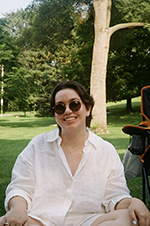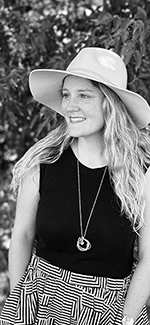|
|
Three weeks left to submit!
Annie MacKillican,
#228 poetry contributor
 Past poetry contributor Em Dial talks with the fall issue #228 contributor about Audre Lorde’s work, the liminal quality of the bedroom, and Annie's poem “Revolution headquarters.” Past poetry contributor Em Dial talks with the fall issue #228 contributor about Audre Lorde’s work, the liminal quality of the bedroom, and Annie's poem “Revolution headquarters.”
ED: From the first line of this poem, “The revolution begins in my bedroom,” the reader is placed in conversation with feminist text via this play on a phrase from Cherríe Moraga and Gloria Anzaldúa’s This Bridge Called My Back: Writings by Radical Women of Color: “The revolution begins at home.” Where do you see your work building on the work of feminist thinkers like Moraga and Anzaldúa?
AM:
I’ll first say that it’s deeply humbling for my work to be in conversation with these writers—as an Indigenous poet it’s very important to me to recognize that my writing could not exist without the Indigenous women and queer writers who built a platform for me to stand on, and the Black women and writers of colour who came before them. Audre Lorde’s essay, “The Master’s Tools Will Never Dismantle the Master’s House,” which is included in This Bridge Called My Back was a fundamental piece of literature in my radicalization as a young person—it changed something in me, and so to talk about my own conceptions of girlhood and revolution in tandem with Lorde’s work is an immense privilege. Audre Lorde writes about this notion that maternity, and nurturing are the primary tools that women can use to resist the patriarchy—I think in a way, “Revolution headquarters” shows the reader a kind of microcosm of these larger structures that feminist writers have long been highlighting. When a young girl has autonomy and safety in a physical space like her bedroom, she can begin to internalize her role as part of something greater.
Read the rest of Annie MacKillican's interview.
Colleen Sutton,
#228 cnf contributor
 Fiction Editorial Board intern JR Fellers talks with the fall issue #228 contributor about the lustre of Cathy from East of Eden, the joy of reading “less classy” books, and her cnf piece, “East of LA.” Fiction Editorial Board intern JR Fellers talks with the fall issue #228 contributor about the lustre of Cathy from East of Eden, the joy of reading “less classy” books, and her cnf piece, “East of LA.”
JRF: While this essay provides a retrospective lens on a pivotal summer in your young life, it is written in the present tense. Can you speak to how this choice impacted the writing? Were you able to connect more intimately with your younger self?
CS:
The first paragraph of this story came to me fully formed, and the voice was my voice—I feel her, hear her, know her—but it’s still a voice from nearly three decades ago. Some of those memories are so crisp—I remember clearly using my brother’s back as a writing table, I remember meeting Dan David while laying by the pool, but I remember it only from my twelve-year-old self, if that makes sense. So there was no other way for me to tell the story, than from her perspective. It did make for some tougher moments while drafting—I wanted to jump ahead, to lend my adult perspective to what she was experiencing, and had to hold that in check. I also had to watch my language and phrasing—editing out some parts where I knew my twelve-year-old self hadn’t spoken or thought that way, spending some time thinking back to how I acted and reacted at that age. I read some old journal/diary entries I’d kept from that period, and I can’t believe how precocious and mature I sounded—as if I were writing these notes just to impress an older version of myself one day. Or perhaps I thought a biographer would read them, who knows, I was grandiose to say the least. Gosh, it must have been tiring, being twelve. I had to keep the story tightly constrained to what I knew then, without adding any adult, lessons-learned aspects. Deciding how much to reveal of Dan David—I deliberately kept only the details that I knew at the time, tried to keep the sensations I had felt at the time, and not my adult disenchantment. The story would be very different if told from the perspective of a woman in her 30s, looking back, than it is from the twelve-year-old girl’s view. Writing it did make me feel a bit tender towards her, for all she didn’t yet know of the world and for all she had already intuited. We consider children so innocent, yet I remember quite clearly knowing so much.
Read the rest of Colleen Sutton's interview and a memoir excerpt.
Sophie Crocker,
#228 fiction contributor
 Past fiction contributor Kaye Miller talks with the fall issue #228 contributor about duality, reading recommendations for Geminis, and her story, “Castor & Pollux.” Past fiction contributor Kaye Miller talks with the fall issue #228 contributor about duality, reading recommendations for Geminis, and her story, “Castor & Pollux.”
KM: Duality is a big theme in this piece, as is inherent to the concept of the Gemini. The story is riddled with unlikely pairings—“rates of crime and improvised theatre,” long-lost twins, and the push and pull of the Gemini personality with the grim realities of being conscripted into a space war. What is it about this theme that intrigued you?
SC:
The specific line about crime and improvised theatre is definitely a reference to my own life, in that I’ve been accused of both. I’ve had a few people ask RE: this story if I hate Geminis, and I both love and hate them—that’s the whole point of a Gemini. I’m a double Gemini (sorry!!!) with a Gemini father, Gemini friends (duh), and a (redacted but embarrassingly high) number of Gemini lovers/exes. For a while, I was engaged to a Gemini with the same birthday as me. Even my cat is a Gemini.
There’s something very silly to me about Geminis. My theory about astrology is that while it isn’t “real” (cue tech bros cheering), there’s an emergent way in which it works (tech bros boo). That is, if you’re a January baby, you’re more developed than the other kids when you start school, and if you’re a June baby, you get to do your early growing in the sunshine. Things like that do affect a person’s development, so I think astrology has a point there. The environmental factors of each season affect how you grow. But that’s such a Gemini way to think about it: trying to make magic work through behavioural science.
Gemini-ness also interests me because of that yin-yang balance: how our best traits contain our worst ones and how impossible it really is to think about anything in a true binary. I tried to express that with this story. And there’s something so romantic, in the old sense of the word, about duos. It makes me think of the Pacific Rim concept of being drift compatible. What’s more intimate than that?
Read the rest of Sophie Crocker's interview and a story excerpt.
|
|
|
|
|
|
|
|
|
|
|
|